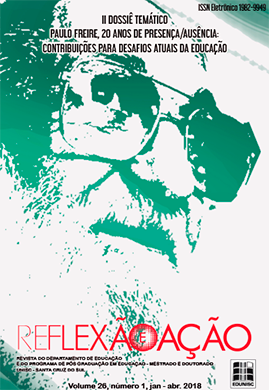THE CONTRIBUTION OF THE "PEDAGOGY OF AUTONOMY" IN TEACHING AND LEARNING GEOGRAPHY FOR THE EDUCATION OF YOUNG AND ADULTS: A POSSIBILITY OF CITIZENSHIP EDUCATION
DOI:
https://doi.org/10.17058/rea.v26i1.8927Keywords:
School Geography, Critical Geography, Dialogical pedagogy, Citizenship education.Abstract
The objective of this article is to present the contribution of the piece of work "Pedagogy of Autonomy" of the educator Paulo Freire for a praxis in School Geography, under his critical perspective. Based on a case study carried out with educators from the Youth and Adult Education Program, of a public school, located in a popular neighborhood in the city of Salvador (BA), a city that undergoes a broad process of restructuring urban policies, the Freire’s dialogic pedagogy founded a teaching-learning practice in Geography for this audience. The results of the research revealed that the collective construction of educators and students of School Geography important concepts, such as landscape, space, territory and place, from the experience of daily life, are presented as possibilities for contextual and critical education, as well as a citizenship education.Downloads
Downloads
Published
How to Cite
Issue
Section
License
The submission of originals to this journal implies on the transference, by the author(s), of the printed and digital publishing rights. The author´s rights to the published articles are the author´s, the journal has the rights over the first publication. The author(s) can only use the same results in other publications, indicating clearly that this journal was the original publisher. Since we are an open access journal, the free use of articles is permitted for educational and scientific applications, as long as they inform the source according with the CC-BY license from Creative Commons.


